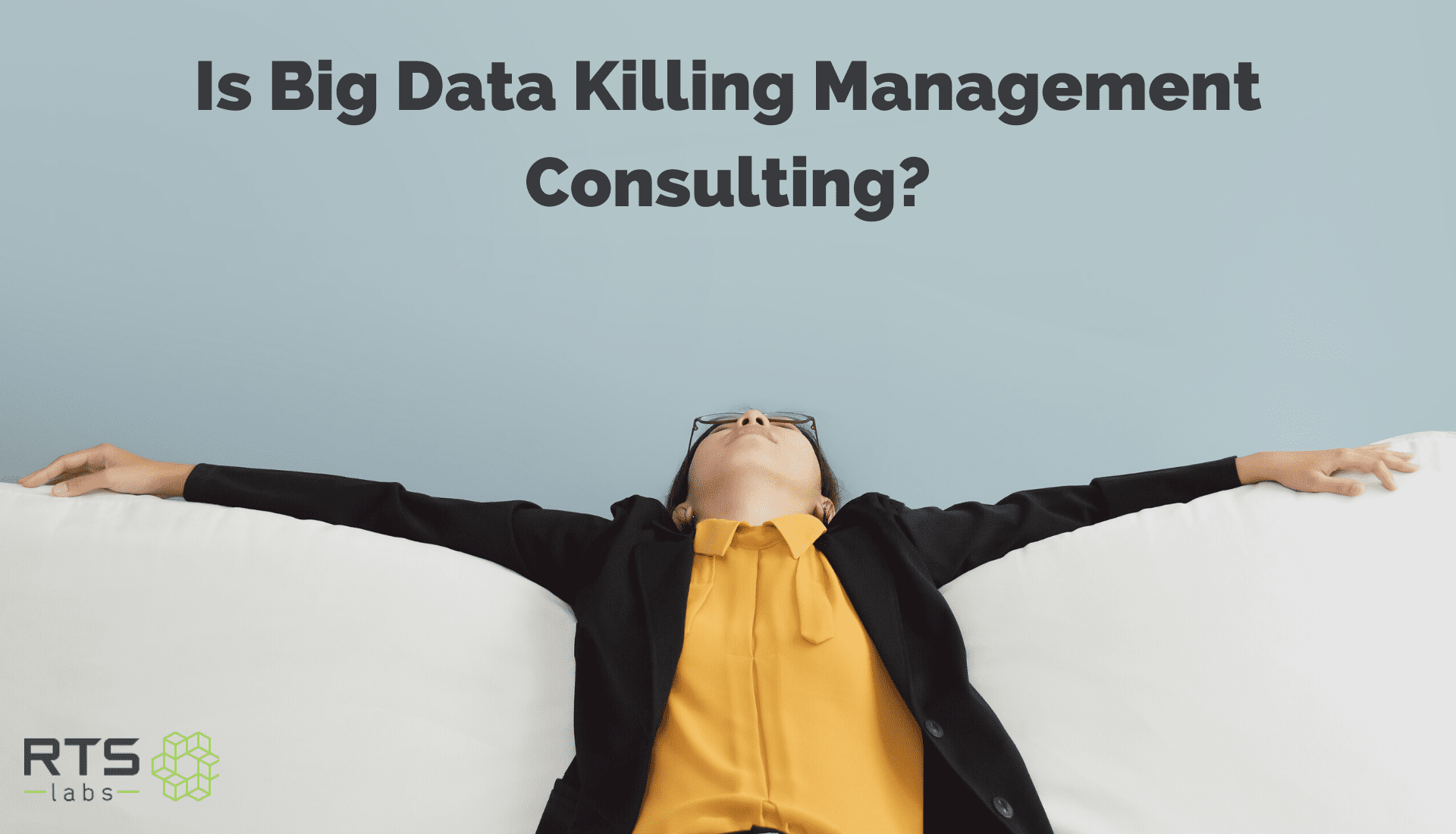Does your business really need a consultant’s help when you can figure things out in-house with big data analytics?
“Big Data” isn’t just a buzzword.
It is a buzzword, and a rather overused one at that. But it’s also a valuable tool in the business intelligence arsenal when deployed correctly.
The problem is, over the past decade, “big data” has been tossed around by executives and management consultants who have only a surface-level understanding of Big Data as a concept, and virtually no clue about how it works or how they’d put it to use if given the tools.
What is big data?
Big data, as we’ve explained in the past, refers to datasets too large and complex for typical programs or algorithms to adequately process.
Regular data is the stuff you plugged into Excel or Google Sheets the other day. It might even be information on thousands of leads that your company’s entered into Salesforce. There can be a lot of it, but you can figure out what it means and what to do with it relatively easily.
Big data, on the other hand, is more than just big.
A good example of big data would be the information Google collects as millions of searches are executed, and millions of YouTube videos are viewed, and millions of emails are sent, and millions of routes are mapped out, and so on.
Each search or video view or email means little on its own.
But over time, compounded by over a billion people performing thousands of various actions, Google’s trove of big data can give it insight into user behavior at macro and micro levels. This allows Google to deliver more meaningful search results, more interesting video suggestions, and fewer spam emails to every consumer.
Google could never transform these billions of data points into useful insights if it had to rely on human number-crunchers trawling through everything, searching for meaning by hand.
It’s only with the help of other buzzword-esque technologies, like artificial intelligence and machine learning, that data scientists and data analysts can transform massively complicated volumes of raw data into meaningful insights to drive businesses forward.
These meaningful business insights have historically been delivered by highly-paid management consultants from companies like Bain, Accenture, McKinsey, and others.
Businesses often paid millions of dollars for teams of bright young people with indecipherable job descriptions to come tell them what was going wrong, and how to fix it.
However, with troves of big data at their disposal, many businesses have begun cutting out the consulting middlemen, and have begun figuring out how to fix their problems on their own.
Who needs big data, anyway?
Does your company generate a ton of data? Is most of it stored in cloud servers because it would quickly overwhelm on-premises hard drives? Have you and your colleagues or employees struggled to figure out what it all means?
If you answered “yes” to all three questions, your company might benefit from a big data solution.
Let’s say you’re trying to improve profitability at a logistics company. You might discover, as UPS did years ago, that having your trucks turn left increases travel time and wastes fuel compared to simply making multiple right turns.
UPS didn’t arrive at this conclusion by having a data analyst ride along in a delivery truck with a stopwatch. The solution came about because UPS collected and analyzed data generated by thousands of trucks, making thousands of different trips, on thousands of different roads.
Small businesses don’t often deploy big data solutions, because they simply don’t collect enough data with sufficient complexity to need it. The larger the business, and the more complex its operations, the more likely it is to have some need of a big data solution.
This doesn’t mean small businesses aren’t making use of big data. In fact, most small businesses take advantage of big data insights all the time without realizing it. Cloud-based applications like Salesforce and Google Docs are continually improved with the help of big data, artificial intelligence, and machine learning. An improved application experience for the small business end user is often the result of extensive AI-driven big data analytics efforts undertaken by app developer.
How are businesses making use of big data?
UPS saved over 10 million gallons of fuel and delivered 350,000 more packages in about 12 years after implementing its no-left-turn policy. Here are some other big data success stories:
Carnival Cruises, with over 100 ships in operation, can make millions more each year if every passenger spends a single additional dollar on their trip. Real-time big data analytics help the company dynamically adjust pricing on ship inventory to entice passengers to spend more on a case-by-case basis.
JE DUNN, one of the world’s largest construction companies, uses artificial intelligence and big data — in partnership with some of its technology providers — to streamline the construction process, improving the accuracy of its pre-build cost estimates, speeding the time from design to completion, and reducing waste throughout the construction process.
Target has used big data analytics to more accurately predict customer behavior and better personalize its promotional marketing mailers. This has occasionally been a little too effective. In one well-publicized example, Target managed to figure out a teenage girl was pregnant before her own family knew about it — her dad chewed out the local store manager for sending baby-related coupons, only to apologize several days later after talking to his daughter and learning the truth.
Do we still need management consultants in the age of AI?
Big data isn’t always the solution when a business has tons of data it can’t quite figure out. It might not be indecipherable because of its complexity; many businesses collect a lot of junk data that isn’t accurate or detailed enough to be useful.
Even if there’s enough high-quality data to utilize big data analytics, the insights produced might be too costly or complex (or both) to be useful. One retailer used big data to discover that it could increase profits by keeping inventory on the floor for longer periods, only to realize that capitalizing on this discovery would involve redesigning its entire supply chain.
Big data might not necessarily provide breakthroughs beyond a consultant’s insight, either. One bank used big data analytics to figure out the optimal location for ATMs, but management consultants working for several other banks had already reached the same conclusions. In this case, the solution wasn’t so complicated to be beyond the reach of human intuition.
So, is big data killing management consulting? We can say with confidence that management consulting isn’t going away, but it won’t stay the same in the age of big data and artificial intelligence either. Some management consulting firms are becoming big data consulting firms, replacing armies of vaguely-titled “consultants” with smaller teams of data scientists and analysts. Others must grapple with the fact that AI-driven big data solutions can now address many problems businesses have historically solved with the help of consultants, such as human resources inefficiencies, badly-targeted marketing, and financial allocations.
Thinking about a big data solution for your business?
- Does your business create more data than you can effectively use?
- Is your business inefficient, but you don’t know how to fix it?
- Do you lack the technical talent to analyze your data in-house?
- Has your business suffered a data breach or hack?
- Have your customers been less satisfied than they could be?
- Have you struggled to increase revenue and/or improve profitability?
If you answered “yes” to these questions, your business might benefit from a big data solution, which could cost less and provide greater returns than hiring a management consulting firm. RTS Labs has extensive experience developing and deploying big data solutions for businesses, and we’d love to help your businesses capitalize on its data, too. Get in touch with us today to find out how big data can boost your business outcomes for the long run.






